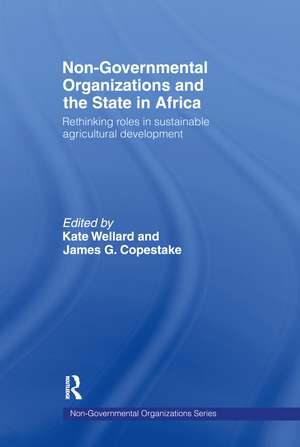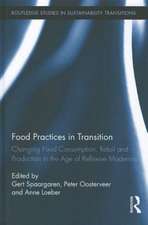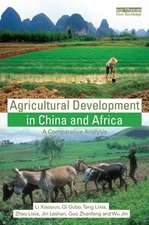Non-Governmental Organizations and the State in Africa: Rethinking Roles in Sustainable Agricultural Development: Non-Governmental Organizations series
Editat de James G. Copestake, Kate Wellarden Limba Engleză Paperback – 2 sep 1993
| Toate formatele și edițiile | Preț | Express |
|---|---|---|
| Paperback (1) | 332.78 lei 43-57 zile | |
| Taylor & Francis – 2 sep 1993 | 332.78 lei 43-57 zile | |
| Hardback (1) | 846.37 lei 43-57 zile | |
| Taylor & Francis – 2 sep 1993 | 846.37 lei 43-57 zile |
Preț: 332.78 lei
Nou
Puncte Express: 499
Preț estimativ în valută:
63.68€ • 66.65$ • 52.100£
63.68€ • 66.65$ • 52.100£
Carte tipărită la comandă
Livrare economică 31 martie-14 aprilie
Preluare comenzi: 021 569.72.76
Specificații
ISBN-13: 9780415088503
ISBN-10: 041508850X
Pagini: 364
Dimensiuni: 156 x 234 x 19 mm
Greutate: 0.52 kg
Ediția:1
Editura: Taylor & Francis
Colecția Routledge
Seria Non-Governmental Organizations series
Locul publicării:Oxford, United Kingdom
ISBN-10: 041508850X
Pagini: 364
Dimensiuni: 156 x 234 x 19 mm
Greutate: 0.52 kg
Ediția:1
Editura: Taylor & Francis
Colecția Routledge
Seria Non-Governmental Organizations series
Locul publicării:Oxford, United Kingdom
Cuprins
Glossary Acknowledgements Preface 1. Introduction 2. Zimbabwe: Country Overview 3. Government Exprience of Collaboration with NGOs in Agricultural Research and Extension 4. Forestry Commission Links with NGOs in Rural Afforestation 5. Silveira House: Propagation of the Use of Hybrid Seed (1968-83) 6. Enda-Zimbabwe and Community Research 7. The Organisation of Rural Associations for Progress and Grassroots Development 8. Kenya: Country Overview 9. Agricultural Activities of Government and NGOs in Siaya District 10. NGO Involvement in Agricultural Activities in Machakos District 11. Development of Participatory Approaches for Promoting Agroforestry: Collaboration Between The Mazingira Institute, ICRAF, Care-Kenya, KEFRI and the Forestry Department 12. Government Experiences of Collaboration with NGOs in Rural Afforestation. 13. Kenya Energy and Environmental Orgnaisation (1981-90) 14. Zambia: Country Overview 15. The Contribution to Agricultural Technology Development of the Gwembe Valley Agricultural Mission (1985-90) 16. Ghana: Country Overview 17. The Association of Church Development Projects (ACDEP) in Northern Ghana 18. Langbensi Agricultural Station: Experiences of Agricultural Research 19. The Gambia: Country Overview 20. Case Study of the Farmer Innovatation and Technology Testing Programme in the Gambia 21. Catholic Relief Services in the Gambia: Evolution From Agricultural Research to Community-based Experimentation. 22. Senegal: Country Overview 23. Rodale Institute/Rodale International/CRAR Senegal 24. The Senegalese Institute for Agricultural research (ISRA) and the Fatick Region Farmers' Association (ARAF) 25 Conclusions References Figures Tables
Notă biografică
James G. Copestake, Kate Wellard
Descriere
Presents twenty specially commissioned case studies of farmer participatory approaches to agricultural innovation initiated by NGOs in Africa and case material is set within the context of NGOs' relations with the State.
Recenzii
Nowhere is the participatory approach to agricultural research more urgently needed than in Africa. These case studies should be read by everyone with a long-term interest in the welfare of rural Africa because they show that, although there is a long way to go, the enthusiasm and commitment are already in place to enable NGOs to meet this vital challenge.' - Paul Richards, Wageningen Agricultural University, The Netherlands














